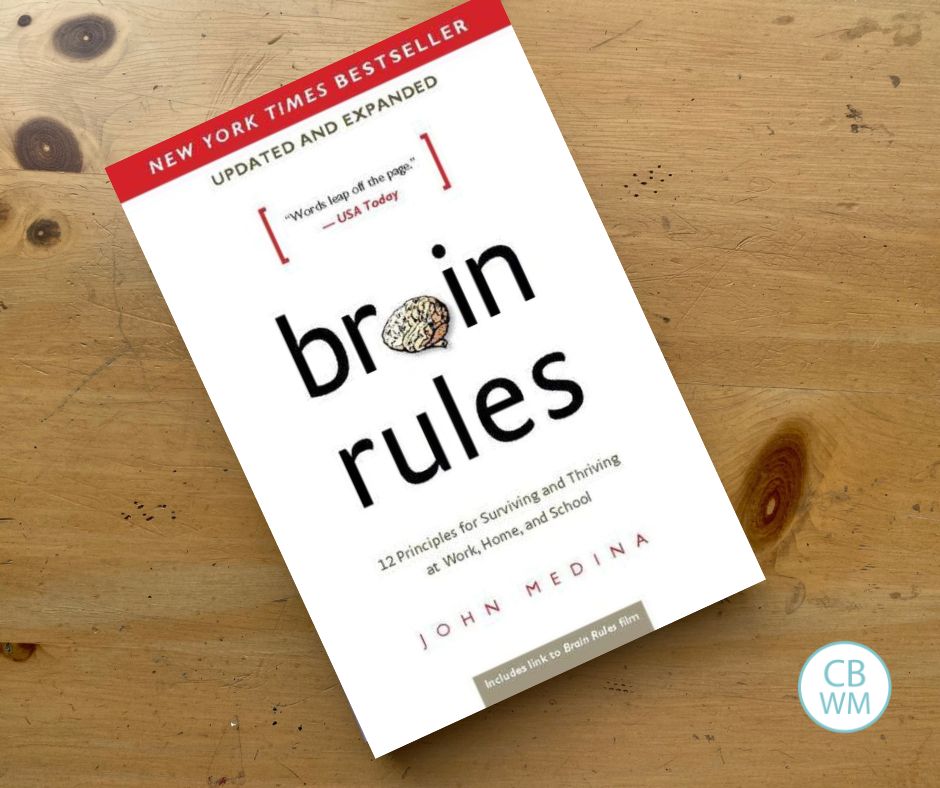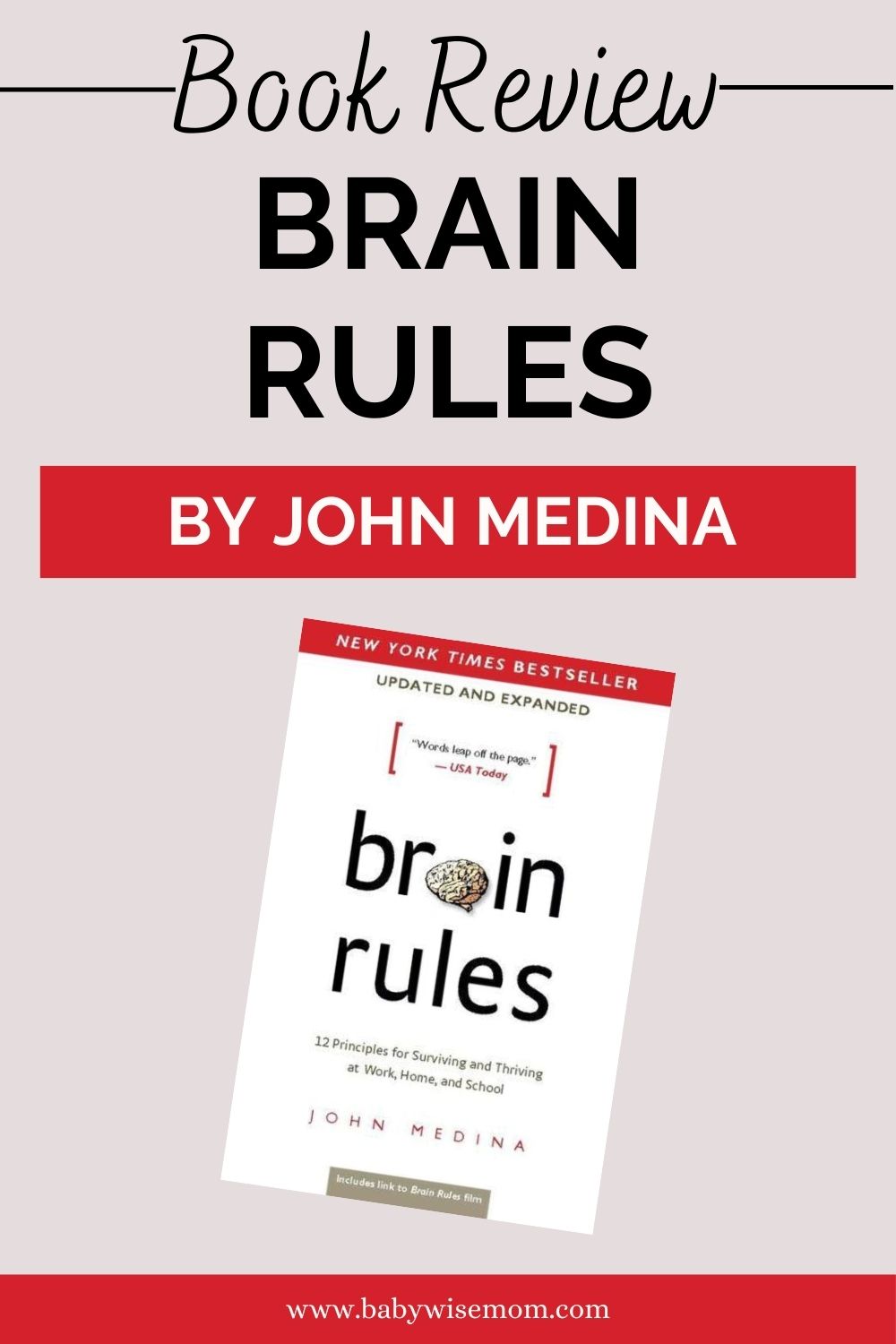Book review of the book Brain Rules by John Medina. Find out what this book is about and how it can help you out as a parent.

I recently finished reading the book Brain Rules by John Medina (which I am pretty sure one of you readers recommended to me, so thank you!). I loved this book. It was very fascinating. I have to warn you, it is very similar to a textbook. There is a lot of information and a lot of studies cited. That is why it is so good :). This book is all about the brain. It talks about 12 rules of the brain–different things that impact the brain and how to keep the brain running at an optimal level. The 12 topics discussed are:
- Survival
- Exercise
- Sleep
- Stress
- Wiring
- Attention
- Memory
- Sensory integration
- Vision
- Music
- Gender
- Exploration
Sleep
Medina had me sold in the sleep chapter. Totally sold. Here are some of my favorite quotes:
“Taken together, these studies show that sleep loss cripples thinking in just about every way you can measure thinking” page 48. I recently saw an article that talked about how sleep is more important than food. This book talks about the same idea. You can literally live longer without food than you can without sleep. Sleep is as important as I think it is.
“Quite literally, the rat seems to be consolidating the day’s learning the night after that learning occurred, and an interruption of that sleep disrupts the learning cycle” page 51. This is referring to a study that found that brains solidify learning during sleep. If you are interrupted during that sleep or if that sleep is cut short, that learning is lost and you have to re-learn it. So again, sleep is as important as I think it is. You know the phrase, “Sleep on it.” Have you ever slept on something? Recently, I was rehearsing a song that had some difficult parts in a quartet. We practiced and practiced and finally said we needed to stop. This was late at night and right before bed. We came back two days later, and we had it. None of us had practiced in between. Sleeping on it is a real thing that can help you.
The whole sleep chapter is fascinating.
Stress
On stress, “One of the greatest predictors of performance in school turns out to be the emotional stability of the home” page 70. To me, this is an argument for the importance of putting marriage first so that the emotional stability of the home can be rock solid.
Attention
On attention, an interesting tidbit here is that people have an attention span of about ten minutes (see page 106). At the ten minute mark, you need to find a way to grab the attention of your audience again, or wrap things up.
Another interesting tidbit on attention is that people pay attention better if you start with key ideas and then give details (see page 115). On page 120, he states, “Give the general idea first, before diving into details, and you will see a 40 percent improvement in understanding.” Though I must say, there is no discussion in this book as to whether this is cultural or not. I know when I was in college and taking Intercultural Communication, I learned that while cultures like the United States like Thesis followed by main points and those main points outlined, cultures like most Asian cultures prefer that the main point came at the end. I found this to be true working as a writing tutor in the writing lab on campus. The Asian students had a very hard time writing their paper with thesis, 3 main points, and supporting arguments. Most of the time, the thesis was never stated. They like it to be inferred. So while this may be true in certain cultures, I wouldn’t take this as a brain fact. My question here is, is this need for main point first to improve understanding something that they find because that is what is culturally taught to the people they are studying, OR is it actually the superior method for increasing understanding?
“…a person who is interrupted takes 50 percent longer to accomplish a task and makes up to 50 percent more errors” (pate 117). And that, my friends, is why everything takes longer when you have children. That is why the time a child is sleeping or in independent playtime is your golden time to be able to get things done. That is why being a mom is challenging. That is also why I am trying a new routine out right now where I focus on one main task a day rather than trying to do a little bit of cleaning, bit of reading, bit of blogging, etc. I am trying one thing per day so that I can really give more attention to each task.
“…people who appear to be good at multitasking actually have good working memories, capable of paying attention to several inputs one at a time” page 118. Studies have apparently found that the brain is actually incapable of multitasking. What you do is spread your attention but are capable of multitasking if you have a good memory and can pick up where you left off last.
Memory
The memory chapter kind of blew my mind. “The events that happen the first time you are exposed to information play a disproportionately greater role in your ability to accurately retrieve it at a later date” (page 141). This is more argument for giving the main point first. That isn’t what blew my mind, however. It is the notion that our memories are built by drawing from past memories. So what we remember is not exactly as it happened, but how it happened and how our brain relates that to other things that have happened in the past and the brain pieces them together to form a memory. You hear about how eye-witness accounts are all very different and this is why. Our past influences our present.
Sensory Integration
I think we all know how strong the sense of smell is in invoking memories. Page 174 talks about that, and points out that smells really appeal to the emotional side of memories. So you remember the emotions tied to a smell rather than the events tied to the smell.
Vision
The vision chapter talks about how vision is the most dominant sense that we have in impacting our memories, “Visual processing doesn’t just assist in the perception of our world. It dominates the perception of our world” (page 184). What you see has far more credibility to your brain than any other sense.
Music
I loved the music chapter, which doesn’t surprise me since I love music so much. “Kids who start music lessons prior to first grade show superior sensory-motor integration when they are adults. These findings alone make a strong case for parents starting music lessons before age 7” (page 208). There is also much argument for music training in schools in this chapter. There are also findings of social benefits through music training (having better social skills–see page 214). “…music training boosts foundational speech-processing tasks, spatial skills, the detection of emotional cues, empathy, and baby-sized social skills” (page 215–in talking about the benefits of music in infants).
There are also studies discussed that find that music actually induces hormonal changes–meaning it impacts your mood (page 216). I think we all know that anecdotally. Take this information to teach your children to love good music and to play music in your home that can lift the mood. Also, if you find your are grumpy, turn on your favorite playlist. If you are all cleaning, turn on some fun music to make it a more enjoyable experience. Music is a powerful tool you can use in your home.
Gender
In the gender chapter, I found it interesting that researchers have found that in general, women’s brains pay attention to details while men pay attention to the gist (page 232). I think this is helpful to keep in mind when being frustrated with your spouse or child over something. Men look at the big picture but not necessarily the details. So, for example, if you ask your husband to get your child ready for the day and he picks out an outfit that doesn’t match and doesn’t quite comb the hair, he thinks he got the child ready while you beg to differ.
I also liked what he says here, “Imagine environments where gender differences are both noted and celebrated, as opposed to ignored and marginalized…We might even create better marriages” (page 240). Medina talks about how men and women have different brains. They just are different. When you look at the brains, they are even structurally different. I love his point here. We can pretend we are all the same and essentially kick against the pricks, or we can make life easier and more understandable if we acknowledge and accept the differences that are inherently there and work with each other rather than against each other.
Exploration
In the final chapter, Medina talks about the human urge to explore things. He talks about how amazing little scientists babies are and how they have an “incessant curiosity that compels them to aggressively explore [the world around them] (page 246). He talks about how amazing they are at learning things. He then goes on to talk about how cute little babies “transform into rebellious little tyrants. Many parents think their children are actively defying them at this stage…That would be a mistake, however. This stage is simply the natural extension of a sophisticated research program begun at birth” (page 250). This is a strong argument for the importance of consistency in life for our children. It is also a strong argument for the need for you to respond to inquiries, fits, and tantrums in a consistent manner. In addition, this tells you to not freak out when a tantrum happens. It is normal. It is part of the growing up process. It is a way for your child to test your response to the situation.
Medina talks about how important it is to allow your child to continue to be curious in life. It will keep children willing to learn new things as they grow. Encourage curiosity. Answer questions. Help your child discover answers. Don’t mock questions. Guide your child in learning new things.
Medina also talks about how adult brains are still able to learn (see page 252). You can “teach a dog new tricks.” Some parts of the adult brain are just “…malleable as a baby’s brain…” (page 252). You can still learn new things!
I have highlighted some of my favorite quotes from this book. I highly recommend it. I also noticed that there is a Brain Rules for Baby where Medina talks about the brain rules and how that should apply to parenting. I think it looks very interesting!
Related Posts

